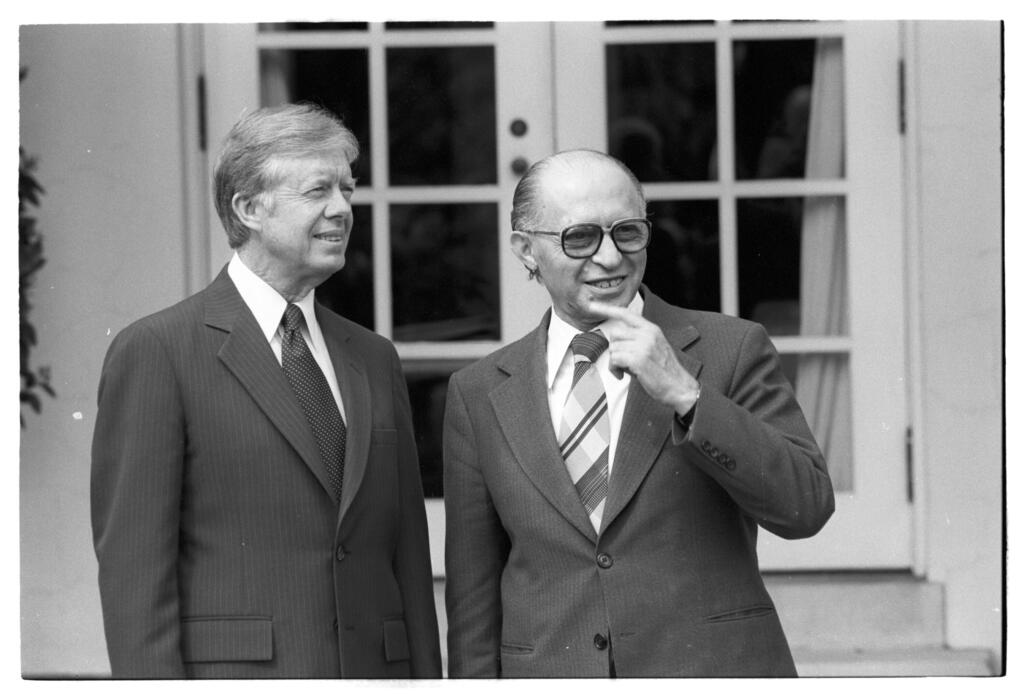You hear a lot of talk these days about how "everyone agrees" judicial reform is needed, but not necessarily the authoritarian overhaul. Well, reform is indeed needed - but not even vaguely in the direction the government wants. What needs radical reforming is Israel’s national strategy toward the ultra-Orthodox and the Palestinians.
Related Stories:
Sadly, neither of the two political blocs that have emerged here is remotely capable of executing the needed root canal. What must happen is a realignment of politics to carry out a national salvation plan. Why such drastic language? Because modern Israel is marching blindly toward self-destruction.
First, Israel is gradually becoming a non-democratic bi-national state (about half of which is non-Jewish) because of the settlement enterprise in the West Bank. It's a complicated problem to solve because of the security risks involved in a West Bank pullout, but merging the Jewish and Palestinian populations forever is not merely a risk to Israel, it is fatal to any notion of a Jewish-majority state.
Anyone who wants to preserve such a state, and can count, must seek to freeze and eventually remove the settlements beyond the security fence line and switch to a declared strategy of striving for partition. But the right is not capable of this because of its dependence on the Jewish fascists of the far right, whose raison d’etre is precisely the occupation.
Second, because of the ultra-Orthodox birth rate (almost seven children per family), the sector’s widespread rejection of a core curriculum, and its sanctification of lifelong religious studies for men, the Jewish side of Israel is marching towards oblivion.
There is an urgent need to end the child allowances and lifetime salaries for yeshiva and kollel students, along with making math, science and English studies mandatory for every citizen, and eliminating the evasion of military and national service.
A massive incentive must be provided to the ultra-Orthodox to leave Torah study to the few true sages, go to work like normal people, stop depending financially on secular Israelis who are approaching open rebellion against them, and integrate into society.
5 View gallery


Ultra-Orthodox crowd protests outside army recruiting station
(Photo: Alex Kolomoisky)
Without all this, and the lowering of the birthrate that should result, the ultra-Orthodox will become the majority within several decades, and the country will transform into a theocracy. The productive sector will flee en masse, the economy will collapse, and the Palestinians will make mincemeat out of the mendicants and yeshiva buchers who remain. But the right cannot do anything to head this off, because of its dependence on the ultra-Orthodox.
It is quite clear, then, what needs to happen to stem the bleeding, change course and rescue the Zionist enterprise. The center-left understands all of it, but is too weak to act decisively.
Beyond the feebleness of liberals all over the world, the special helplessness in Israel also stems from the political dependence on the Arab parties: most of the leaders of the Arab sector are not liberals and do not share the sense of urgency on the demographic issue (to say the least). It is not practical to wait for the center-left parties to come up with solutions in time. Their recent pitiful campaigns reflected precisely their lack of energy and focus
Despite some pretty favorable polls at the moment – stemming from the rank horribleness of the current government of draft dodgers and fanatics, waiting for results from the center-left alone is not a viable strategy.
The more interesting question concerns the right-wing bloc, which Menachem Begin invented in the 1977 election. Likud, which was itself a new combination of disaffected nationalists and economic libertarians, formed an alliance with the religious parties.
5 View gallery


Menachem Begin (right) with U.S. President Jimmy Carter at the White House, 1980
(Photo: David Rubinger)
Despite some ill-advised efforts by the left over the years to tempt the religious to switch, as if they held the “balance of power,” the reality is that the religious-right alliance has been clear and durable. Since then, whenever these elements won a majority, the Likud leader became prime minister.
Sometimes the coalition included leftist parties, but they lacked the leverage to impose smarter policies. At most, they reduced some of the damage – and this setup earned a partly deserved reputation as sellouts.
In order for a future centrist coalition with the Likud included to be different (regardless of who leads it), the Likud itself needs to change course and want to save the country. Perhaps it can be tempted by offering it the leadership, even if the center-left wins the election.
It seems absurd to rely on a party that already in the 1980s brought hyperinflation to Israel and the pointless 18 years of occupation in Lebanon (which gave birth to Hezbollah and the presence of Iran on the northern border), which is responsible for the cancerous growth of settlements, and whose senior ranks feature thugs, fools and manifest incompetents. But at the end of the day, most Likud voters do not really want the destruction of the modern Zionist state. These days, they are starting to figure it out.
Indeed, Likud leaders have a somewhat amusing history of abandoning their own stated policies - from Begin himself to Ariel Sharon, Ehud Olmert and Tzipi Livni, not to mention Roni Milo, Meir Shtrit and Dan Meridor. All, in different ways, became semi-“leftists.” The central tenets of the right are disastrous, and the smarter members of this mafia know it very well.
The realignment cannot happen as long as Benjamin Netanyahu is around. His legal troubles and outrageous, disgraceful conduct now completely disqualify him as a partner for the center-left. Moreover, it's doubtful that he wants any such thing – although I assess, based on multiple meetings with him, that he is more than perceptive enough to understand the damage he is causing.
The faint hope, then, is that after the Netanyahu era, the structure of the blocs will be broken and a centrist coalition will be formed with the Likud, which will do what is necessary with the determination level of a parent extinguishing a fire in the baby room. Such cooperation is a much more likely way to save the Zionist project than waiting for the center-left to win big enough to be able to do what is necessary.
This is not such a drama: Israel can learn from the wider world that does not freeze in its tracks and does not view elections as a kind of census of its sectors.
In France, the two major parties were both wiped out during the Emmanuel Macron era. In the UK, the first-past-the-post system inflates the winner's majority so that coalitions are rarely needed - but when they are, as in 2010, the results can be surprising.
In Italy, new parties are constantly forming that can really gain power - and while constantly changing alliances do not create stability, at least there is a discourse.
Canada has a multi-party system with no permanent coalitions. In Germany, Sweden and other countries, the coalitions change, and there is no "natural partnership" between the moderate and extreme wings of the right.
All these countries are no less democratic than Israel (and if Netanyahu gets his way, far more democratic) – yet they manage somehow without two blocs set in stone.
For now, the rational side of the political scene must remain united against what can only be termed the Netanyahu coup. Benny Gantz, Yair Lapid and the others are being forced to adopt an aggressive position of the type that they unwisely misplaced in their last campaign. But in the longer term, it is desirable to reach out to Likud - on the condition that its leaders agree to the necessary steps: separating from the Palestinians and blowing up the whole arrangement with the ultra-Orthodox.
I do not know if this will happen. But I have no doubt that it is needed for modern Israel to reach 100. There is, at best, a 25-year window for national salvation.
The writer is a former Cairo-based Middle East editor and London-based Europe/Africa editor of the Associated Press, and served as the chairman of the Foreign Press Association in Jerusalem. Follow him at https://danperry.substack.com.




